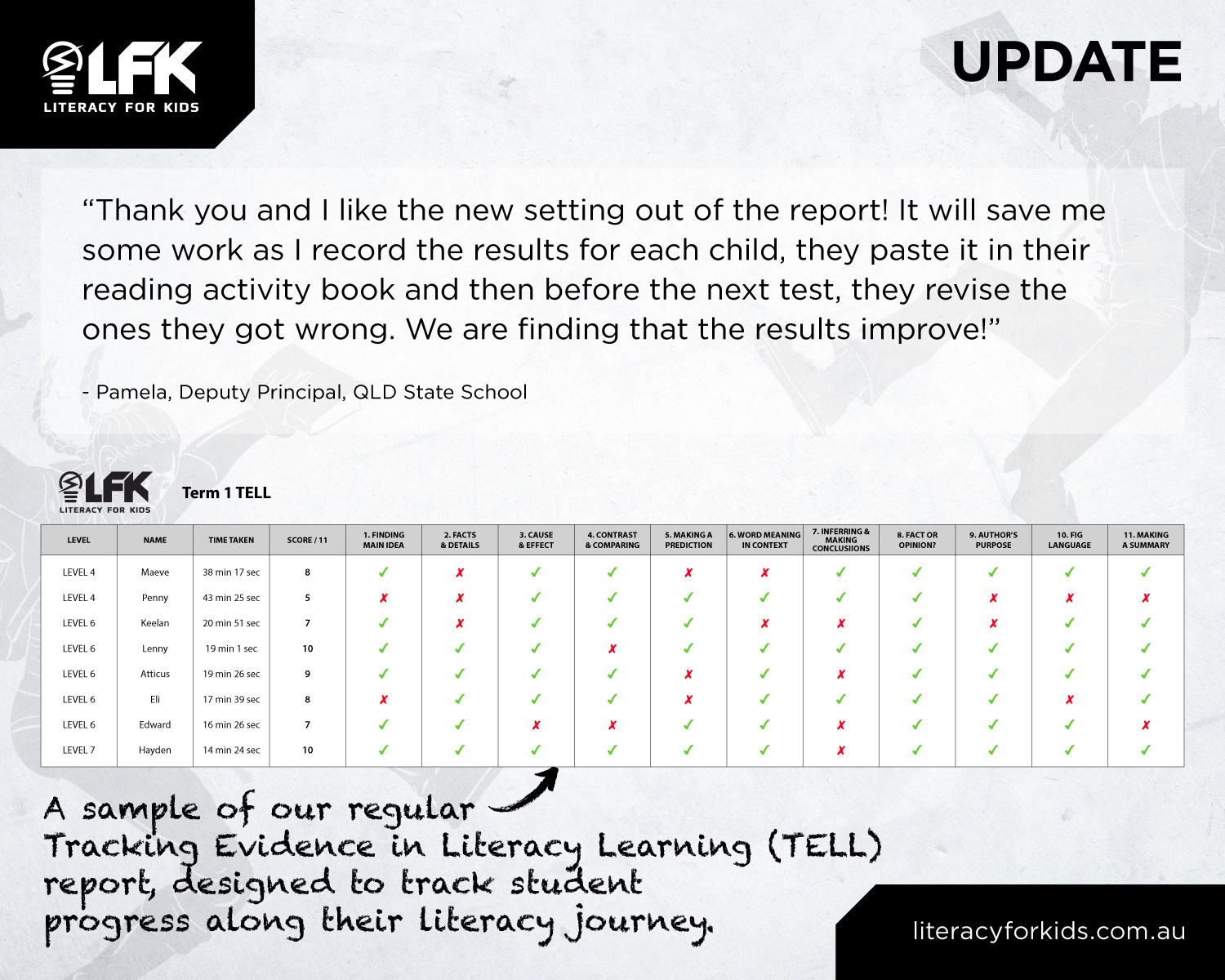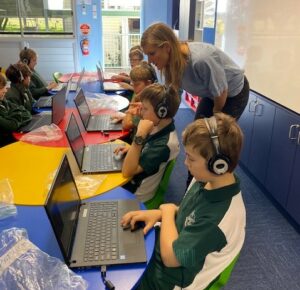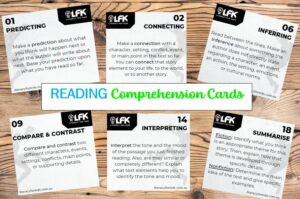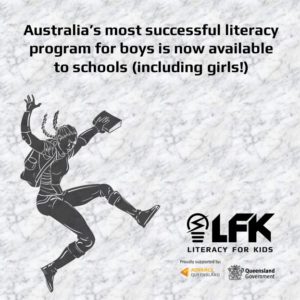7 Ways to Identify and Build Your Child’s Academic Capabilities

It is more than a coincidence that I have received calls from multiple parents concerned about their son’s reading ability this week – all are in Year 3.
Fewer than 1 in 5 students who are behind in Year 3 catch up and stay caught up. (AERO, March 2024)
Learning gains are hard to maintain. Students who perform below expectations are not likely to catch up without extra support. As we the approach mid-year mark, how do you ensure your child’s education success? How do you truly understand their potential and nurture it? How do we help our kids to succeed both inside and outside the classroom?
We have curated a list of 7 important strategies to improve academic performance of students and identify their potential.
1. Encourage learning time for kids
2. Regularly communicate with your child’s teacher
This is my first piece of advice to parents. It cannot be stressed enough how important parent-teacher meetings are to getting the most out of your child’s education. Attend them regularly. While you will naturally discuss your child’s academic performance and areas for improvement, make sure to also recognise their progress and strengths. Highlight the positives after the meeting. Ensure your child does not feel like you and the teacher are teaming up against them. Don’t let them hear you complaining about them to the teacher.
Also, ask for evidence of growth and progress. If you’re still concerned, reach out to our team here at info@literacyforkids.com.au and we can assist with targetted assessments.
3. Offer your child choices
This strategy has been key to the success of our online literacy programs ~ offer children choices to read what interests them.
As your children grow, striking a balance between exploration and structure becomes crucial. Here’s how you can support them:
- Offer lots of books to choose from! Pose the question, “Would you prefer to read Heroes of Olympus or explore a book about soccer?”
- Involve them in selecting project ideas while gently guiding them towards educational objectives. (For instance, if a student expresses interest in soccer, encourage them to delve into researching soccer athletes that they admire. As a parent, read the book too which communicates that you value their choice.)
By offering your children choices within established boundaries, you empower them to feel more engaged and confident in their decision-making.
4. Set definite, but kind expectations
It’s not only the words you use; it’s also the tone and manner in which you communicate them. Naturally, you desire your child to excel academically. However, it’s crucial to establish aspirations for them that are both clear and realistic.
Consider phrasing such as, “I recognise that maths can be challenging, but I have faith in your abilities. Just give it your best effort!” rather than “You need to ace that math test, or else…” Both expressions underscore the significance of academic achievement, but the former reassures your child of your supportive stance during difficult times.
5. Be their safe space
I am currently managing stress with our children during exams, assignments and submitting projects (one child submitted the wrong assignment – it wasn’t great!). There may be feelings of overwhelm or anxiety. In such moments, your role as a parent becomes paramount. They rely on your calm presence and guidance. As a parent, your duty extends beyond simply motivating kids to study; it involves serving as their confidant during challenging times.
Providing a listening ear, demonstrating empathy, and offering advice can be beneficial. Discussing your own past struggles and how you coped with them can make you more relatable and foster trust, encouraging them to share their own concerns.
Great advice that I once received was to just pop in with a hot chocolate and their favourite snack. Just place it on their desk, no need for comment, it just communicates calm and presence.
6. Identify their passions early on
To fully unleash your children’s potential, begin by closely observing them from an early age. Notice what ignites their curiosity and how they respond to various situations and obstacles. Extracurricular activities are also significant. Your children’s hobbies and creative endeavours could reveal insights into their academic strengths, so foster these interests. This attentiveness is crucial to their educational journey. By doing so, you’ll be better equipped to support their academic growth and ready them for upcoming challenges.
7. Listen to your instincts as a parent: nothing to lose, everything to gain
Your gut feeling isn’t wrong. When you sense that your child is struggling or needs help, you are very likely correct. The parents I have spoken with during the week have noticed how their sons are avoiding reading – it’s important to explore why. Following those instincts, and seeking out support systems for your child, can make a difference in their confidence and performance for years to come.
Seeking out academic help can take many forms, and most methods stand to benefit your child. For example:
- Parents can request neuropsychological or educational testing to develop a stronger understanding of their child’s needs. The testing can be extensive, but it lends valuable information to you, your child, and your child’s educators.
- Students can work together with their parents and teachers to create a plan to study smarter or receive extra help. Student resource departments might even draft an individualized education plan (IEP) for your child, allowing him/her the tools he/she needs to succeed throughout their ongoing education.
- Students might also seek support to learn social-emotional or academic stress management skills. Parents can help their child explore non-academic interventions like traditional therapy, mindfulness training, athletic or artistic outlets, and more.
- Specialized tutoring outside of school, such as executive function coaching, can give your child training that is not always covered in an average curriculum. Executive function coaches ensure that your child learns planning and organizational skills needed to become a successful student and person.
Your role in steering your child toward their full potential is pivotal. As a parent, your impact extends beyond the mere provision of material resources. Be actively involved, attentive, and present for your child consistently. Recognize that it’s not solely about applauding academic triumphs; it’s also about offering love and positivity to navigate them through challenges and setbacks.
Attention Teachers: Indicators for Student Growth
In our discussions with educators, we found that they want tasks and measures to help assess the effectiveness of instruction, as well as clear criteria for mastery. This is why we created our latest report ~

This report helps you to better judge not only if students are making progress, but also the rate at which students make progress (term-by-term comparison).
The Reading Comprehension texts are at the appropriate level and complexity that the student can read independently and show 11 specific comprehension skills/strategies.
 A successful literacy program’s content must be aligned with literacy outcomes. Literacy for Kids guarantees that your students work through engaging, quality content that focuses on essential skills in the core strands of literacy.
A successful literacy program’s content must be aligned with literacy outcomes. Literacy for Kids guarantees that your students work through engaging, quality content that focuses on essential skills in the core strands of literacy.LFK is a valuable teaching tool tailored to the needs, strengths, and interests of students. This is what sets our program apart – rich, engaging literacy experiences that gets results.
Literacy for Kids is currently in 250+ schools around Australia and NZ – and growing!
Contact us for your free trial and see how we can work with your school to improve literacy.
Our literacy programs have created the reading content to support your teaching. STEM, history, creative writing, science: with hundreds of kid-centric topics to choose from, our programs have been proven to lift literacy in schools and at home. Contact us today.
Confirmed Results!
An effective reading program needs to be backed by strong results. Literacy for Boys was independently tested in one of the largest State Primary schools in Qld. Students in Years 3 to 6 improved their reading, spelling and comprehension ages by an average of 12 months after only 18 weeks on our program! Click here for the full report.
Contact us if you’d like to trial Literacy for Boys or Literacy for Kids in your school.
info@literacyforboys.com.au
info@literacyforkids.com.au
Want your students to finish strong in their literacy? Want more from your literacy program? Contact us for a 30-day free trial in your school or classroom. New schools receive these great ‘Turn and Talk’ comprehension cards for their classroom ~

Student Comprehension Cards
Check out our blogs for more ideas and tips.
Literacy for Kids scores 100% improvement in reading skills with Year 6 Cohort
5 Ways to Build Student Confidence
Identify Comprehension Gaps with these great cards
Steps to Successfully Support Disengaged Learners
See us featured in The Educator Australia magazine
Research confirms that early reading boosts literacy
Boys Love LFB – Here’s what they have to say!
Get boys reading in the digital age
Why write? Tips for reluctant writers
Brought to you by Tanya Grambower


